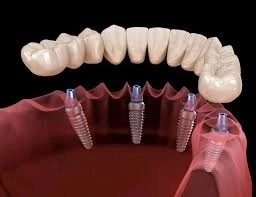
Dental Implants with Dr. Moamen SarhanThe Ideal Solution for Missing Teeth
Published on: 2025-06-28 | Written by: Dental Wellness Clinic Dr. Moamen Sarhan Lecturer of Dental Prosthetics and Implants
Tooth loss not only affects your appearance but also your ability to chew and speak properly. Over time, it can lead to oral health complications. Dental implants have become a highly effective and advanced solution to permanently replace missing teeth. Dr. Moamen Sarhan explains the procedure, its benefits, and success conditions.
What Are Dental Implants?
Dental implants are artificial roots, usually made of titanium, surgically placed into the jawbone. These implants serve as a base for crowns or prosthetic teeth that look and function just like natural ones.
According to Dr. Moamen Sarhan, implants can replace a single tooth or support a full-arch prosthesis.
Steps of the Dental Implant Procedure:
-
Assessment and Imaging
3D scans and medical tests to evaluate bone density and gum health. -
Surgical Implant Placement
The implant is placed in the jawbone under local anesthesia. -
Osseointegration Phase (3–6 months)
During this time, the implant integrates with the bone. -
Final Restoration
A crown or prosthetic tooth is attached once the implant is stable.
Dr. Moamen Sarhan adds that some patients are candidates for immediate implants if bone quality is adequate and there’s no active infection.
Conditions for Implant Success:
-
Sufficient jawbone density
-
Healthy gums
-
No smoking
-
Regular dental follow-ups
-
Good oral hygiene
As Dr. Moamen Sarhan emphasizes, proper planning and precise execution are key to long-term implant success.
Advantages of Dental Implants:
-
Prevent jawbone loss
-
Natural look and feel
-
No harm to neighboring teeth
-
Stable for chewing and speaking
-
Long-lasting with proper care
Dr. Moamen Sarhan stresses that implants are a more permanent and reliable option than removable prostheses, especially for younger and middle-aged adults.
When Are Dental Implants Not Recommended?
-
Uncontrolled chronic conditions (e.g., severe diabetes)
-
Severe bone loss without reconstruction options
-
Serious immune disorders
-
Pregnancy (best to postpone)
However, Dr. Moamen Sarhan notes that most patients can be prepared for implant procedures after initial treatments.

